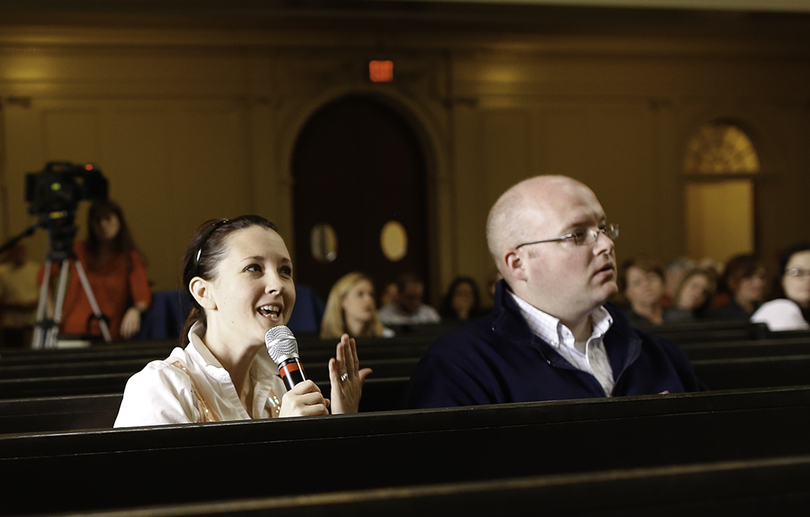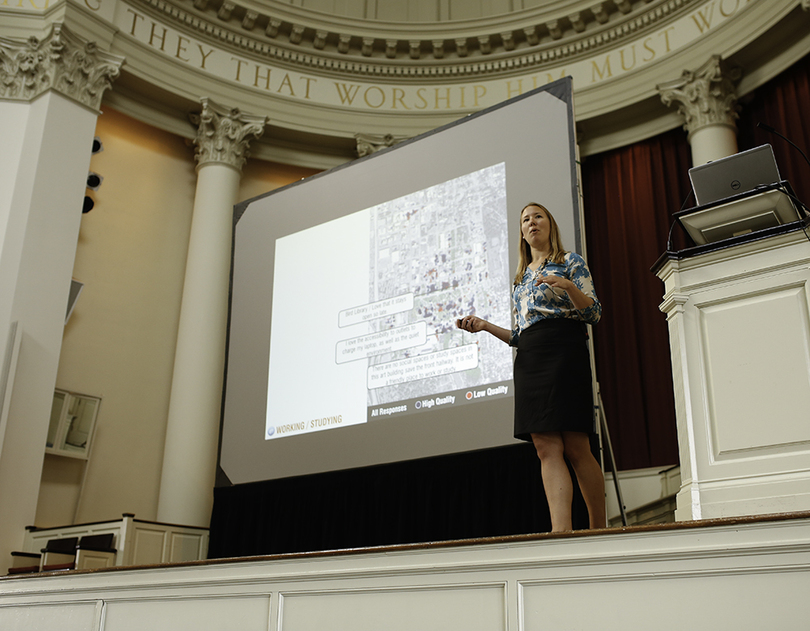Firm presents results of Campus Master Plan survey
Security and transportation were two of the most pressing issues presented on Tuesday by the design firm working with Syracuse University on its Campus Master Plan.
Sasaki Associates hosted two meetings on Tuesday in Hendricks Chapel to explain and answer questions about the results of a campus survey, which was sent out to SU students, faculty and staff earlier this semester. Sasaki Associates is a Massachusetts-based architecture and design firm. The survey garnered 3,005 responses and 45 percent of the responses were from students, 39 percent were from staff and 16 percent of the responses were from faculty.
Around 80 people attended the first meeting held at noon, but most of the participants were staff and faculty members. When Ricardo Dumont, the principle of Sasaki Associates, asked attendees to raise their hand if they participated in the survey, a majority indicated they had.
The College of Visual and Performing Arts was the college with the highest amount of participants in the survey with 495 responses. Maggie Dolan, a staff member of Sasaki Associates, answered questions from the audience at the end of the presentation and said students who work at the Nancy Cantor Warehouse indicated that they don’t feel connected to main campus.
Kelsey Corbishley, a senior interior design major, said after the forum that she thought the reason VPA gave the most responses is because students have to go downtown to the Warehouse every day. She added that students commonly face safety and transportation issues when they go to the Warehouse. Most students who go to the Warehouse opt out of taking the Centro buses, because it takes about 45 minutes to get to class that way, Corbishley said.
“Because of driving we all have to find places to park downtown, which leads us to unsafe areas,” she said. “I mean my car, plenty of my friends’ (cars) have been broken into.”
Dolan said during her presentation that others expressed concerns in the survey about safety around Comstock Avenue and in Thornden Park, particularly at night. Students also expressed safety concerns about West Campus as well.
The slides also showed direct comments from the survey. One comment on the slide about safety responses said, “Thornden Park is awesome during the day but everyone knows not to walk through it at night.”
Attendees said at the end of the meeting that some solutions to these safety concerns would be to add more lights around the concerned areas.
The state of classrooms on campus received a larger amount of negative comments in the survey than other topics, Dolan said. Some of the comments included in the presentation criticized the facilities of classrooms in Huntington Hall.
“Huntington Hall … some of the worst classrooms I have been in. Leaking pipes would often drip on students during class. Many of these rooms were incredibly hot in the winter, making it difficult to concentrate. Some ground floor classrooms have windows that are nailed shut,” read one comment.
Overall, students were pleased with housing on campus, despite many comments about the need to renovate bathrooms, Dolan said.
Students who lived off campus commented in the survey that they did not want to live on campus, because it was too expensive. Students who lived off campus added that they have to sacrifice security for affordability.
“There is a four-foot-long crack in our ceiling that leaks from the bathroom above us into our kitchen that our landlord won’t fix,” read one comment in the housing portion of the survey.
Meanwhile, students who live on South Campus said in the survey that they don’t mind living farther from main campus, because the quality of facilities are worth the commute.
Comments about dining options on campus were fairly satisfactory as well, Dolan said. Some comments said there was a lack of meal swipe options for students who spend a lot of time around the Syracuse Stage.
But students said in the survey that dining halls on main campus were accessible. “The food is OK, but the location is super convenient,” read one comment.
“It’s edible,” read another.
Dolan said 90 percent of transit activity comes from South Campus. Overall, people were satisfied with transit activity, she added. But some comments from the survey said there should be buses that travel to Syracuse Stage from Brewster, Boland and Brockway residence halls. Another comment also said that the lack of buses during breaks doesn’t take into account faculty who are still on campus.
Participants in the survey also indicated that the heart of campus was on the Quad and in the Carrier Dome, Dolan said.
Patrick Neary, president of the Graduate Student Organization, said after the forum that the comments raised in the survey and during the meeting about travel times and classrooms off campus will help strongly shape future conversations for the master plan.
“I think they’re going to have a pretty substantial discussion about — ‘How centralized do we want to be?’ ‘Are we willing to remain dispersed?’” he said.
Dumont, the principle of Sasaki Associates, said the design firm is still in a problem seeking mode. On Wednesday, the design firm will begin to walk through every building on campus, including residential buildings, he added. Dumont also said the faculty collaboration survey results will be shared in January.
Published on October 29, 2014 at 12:01 am
Contact Anna: almerod@syr.edu







